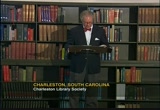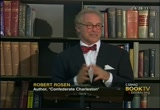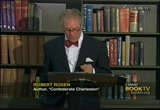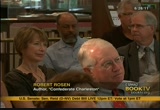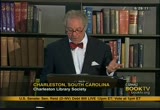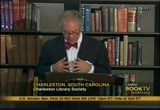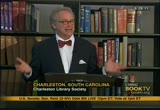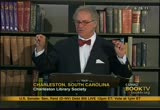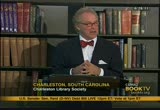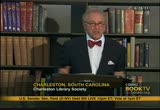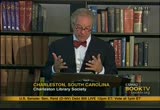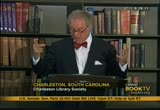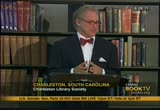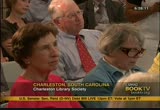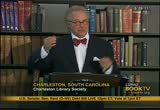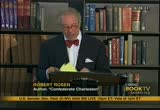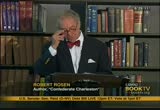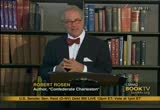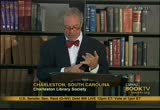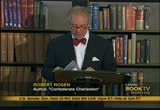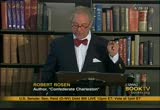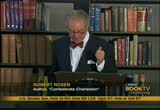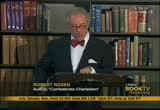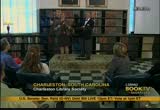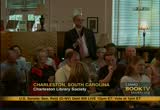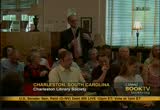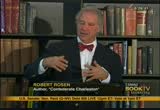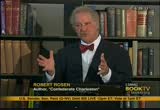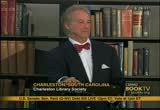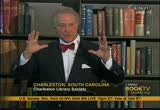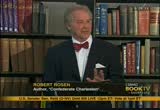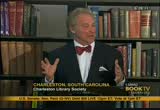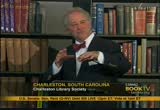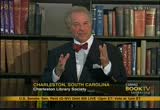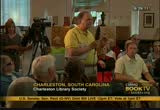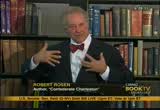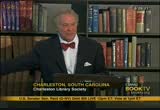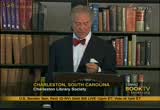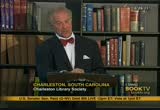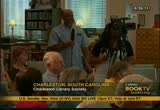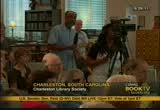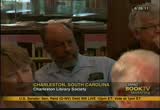tv Book TV CSPAN July 31, 2011 11:15am-12:00pm EDT
11:15 am
just finished. it's an autobiography entitled "infidel" by a somalian-born woman who was brought up in the war-torn area there, lived in several african and middle eastern countries, finally escaped to holland and got political asylum there and became, actually, a member of parliament. um, she was involved in a real controversy, um, based on a movie that she and a man named theo van gogh produced about the harshness of islam and the way that it's being swept under the rugby western countries. this resulted in van gogh being
11:16 am
assassinated in holland and it led to her being put under protective custody for some several weeks. the basic premise of the book is that, number one, the countries that she observed in africa and the middle east are being held back by the religion of islam. particularly because of its harsh treatment of women and not allowing 50% of the population to reach their full potential. andal that western countries such as holland by accepting an extreme version of multiculturalism are actually encouraging radical fundamentalist islam to take
11:17 am
hold and be a art of western -- a part of western democracies with their mistreatment of honor with their honor killings, with their female mutilation and thing of that nature. and so she calls on western democracies to work toward better assimilation and integration of people who have immigrated from former muslim countries. >> tell us what you're reading this summer. send us a tweet at booktv. >> on a recent visit to charleston, south carolina, booktv covered an event with robert rosen, author of "confederate charleston." the book recounts the experiences of people in charleston during the civil war. this 4r5-minute program is from the charleston library society. >> i, i'm delighted to be here. i, um, appreciate all the kind words.
11:18 am
um, the thing i'm not worried about the competition because the other thing that you see on c-span is the house of representatives. [laughter] have y'all ever seen what goes on there? nothing. [laughter] i mean, somebody's talking about something unimportant, and two people are in the audience. i don't know. i thought the government worked a little differently, but c-span has really let us in on the secret. the book i'm promoting is the first shot which is actually written by rick hatcher who's a historian at fort sumter and with a little help from me. but what it is, it's got the most illustrations of any book ever published on the first shot of the civil war. and more importantly, if you buy it for only $25 -- all of you out there in the viewing audience -- the proceeds go to the fort sumter/fort moultrie trust. so it helps with the educational efforts of the trust with regard to fort sumter. they asked me tonight to talk about secession.
11:19 am
most everybody in charleston knows everything about secession, but i'll try and give a more entertaining version of it. south carolina she see seeded from the -- seceded from the union literally around the corner from where we are. 134 meeker -- of course, the building's not there because that's another story. we're about a block away. um, the secession of south carolina and six other states led to the formation of the confederate states of america member 9th. abraham lincoln took office march the 4th. confederates fired on fort sumter april 12th. lincoln called out the troops, virginia finally decided to get off the fence, seceded along with north carolina and arkansas just as the secessionists knew they would, and the war was on the way. so in a very real sense the secession of south carolina really is the beginning of the war. but why did south carolina
11:20 am
secede? is and, you know, i don't have any ancestors who fought in the war. i wish i did, but i don't. um, my grandfather was from russia, and somebody told me one time they had ancestors that fought in the revolution. i said, i do too, the russian revolution. [laughter] but anyway, well, you know, everybody doesn't have ancestors before the revolution. but why did south carolina secede? you know, a lot of our southern friends, particularly sons of confederate veterans and heritage crowd who i love and i love reenactors, and they're great people, really want secession to be about something other than what it was about. and so this is a debate, you know, that's pretty hot and heavy. um, and that really wasn't about slavery, it was really about states' rights, and you've heard all that. it really was about slavery, it really was about race, and it really was about the racial caste system that every white southerner had a stake in. and the thing i find somewhat -- i can't understand about this
11:21 am
argument is the people who seceded were the most accomplished, most educated, wealthiest leaders of south carolina. they were the cream of the leadership of south carolina. and when they seceded, they wrote a document called the declaration of the immediate causes which induce and justify the secession of south carolina. you would think that that would really be the beginning of the end of the story. if you'd like to know why america declared independence from great britain, read the declaration of independence. they say why they did it. i had no reason to doubt thomas jefferson. well, the south carolinians of 1860, um, did the same thing. and if you go through it, it's kind of boring, but, you know, it says that south carolina's now resumed her separate and equal place among the nations. and then they start talking about the fugitive slave law. they say, you know, we signed this compact, the constitution, and the constitution -- and this is very embarrassing -- but in the fourth article of the constitution it says no person
11:22 am
held to service or labor in one state under the laws thereof escaping into another shall in consequence of any law be discharged from such service which is a way of saying if slaves run away, you have to give them back. that's in the constitution. so that was a bargain that the southern states had made at the constitutional convention which, obviously, they took very seriously. now, the fact that i'm arguing about what they did doesn't mean i agree with them, i want to make that very clear. but it seems like no one is really speaking for the people who seceded. in other words, the heritage crowd wants to move the story over here whereas the people themselves who did it were very clear about why they did it. for 25 years this agitation, meaning anti-slavery agitation, has been steadily increasing until it has now secured to its aid the power of the common government, meaning the federal government. observing the forms of the constitution, a sectional party -- the republican party -- has found that now got the
11:23 am
executive department and they're now going to subvert the constitution itself. a geographical line has been drawn across the union, and all the states north of that line have united in the election of a man to the high office of president of the united states, abraham lincoln, whose opinions and purposes are hostile to slavery. you know, and in so many words, we're outta here, you know? you've elected this guy, he says the country cannot endure half slave and half free, and we, we shall be excluded from the common territory, the western territories, the judicial tribunals will will be made sectional, ie the republicans will appoint their friends to the federal bench. horrors of horrors that the party in power would appoint someone to the federal bench, and that a war must be waged against slavery until it shall cease throughout the united states. now, i mean, i don't know why anyone is arguing about why south carolina seceded because the people who did it said what they meant.
11:24 am
but what led up to this? um, you know, i was telling somebody yesterday, you know, this issue of race and this issue of union get very confusing. the south left the union to protect not only slavery, but the racial order, the racial order, um, that blacks were not going to be free and were not going to be able to vote and to preserve the way of life that all white southerners supported. it wasn't just about slavery. um, but, um, but the north did not go to war to end slavery. the war went to north to preserve the union which lincoln was very clear about. and so, you know, in the beginning of this conflict it's not about slavery except that the south left about slavery, but the north went to war to preserve the union. so then event take place. and it's more than just -- and, you know, what is the role of racism in all of this?
11:25 am
racism is a 20th century word. i don't know if anybody would know what you were talking about in 1861. i'm going to read you a statement by an american citizen, not a southerner, about his beliefs about just what white american thought about black americans. i am not, nor ever have been, in favor of bringing about in any way the social and political equality of the white and black races. what everybody, every white person in america thought in 1861, including everybody in the north, i am not, nor ever have been in favor of making voters or jurors of negroes, nor of qualifying them to hold office, nor to intermarry with white people. there is a physical difference between the white and black races which i believe will forever forbid the two races living together on terms of social and political equality. does anyone know who said that? >> [inaudible] >> abraham lincoln. so if you want to know what the
11:26 am
opinion of the north was about race, you know, it's not about race because everybody's a racist by 20th century standards. and so, you know, that, that really i want to sort of set the stage because when people say it's racism, it's this -- you've got to really get the issues correct, get 'em down. now, why did the south want to leave the union? and i'm going to give you a very quick tour through american history. all of you look like you learned this in school because i don't see anyone here under the age of 30. i don't know what they're learning now. i worry -- well, you are. i wonder very much, i worry very much what they're learning. but some of you people may recognize these words; the missouri compromise of 1820 where they had to make a compromise of what could be, this line. nat turner's rebellion, 18 31. the compromise of 1850 brought california into the union. boy, that was a bad piece of legislation. [laughter] you know, they're trying to rename a lake in minnesota,
11:27 am
they're trying to get calhoun's name off of it. calhoun opposed the admission of california to the union, and on that subject he was right. [laughter] now, believe me, we could be bailing california out before it's all over, so don't throw calhoun away quite so quickly. [laughter] fugitive slave act, 1852. uncle tom's cabin. i don't know if any of you have read "the new york times" book review, there's a new book out about the history of uncle tom's cabin. it was the best selling novel of the 19th century. it sold a million copies in the first year. it's a phenomenon. and, um, and be it changed forever the view of people in the north and in europe, particularly in great britain, about what slavery was like. and, of course, it was one of the greatest, most powerful novels ever written. and there's a huge debate today about whether that novel is good, bad, whether we should teach it or not. but nevertheless, it did add to
11:28 am
this agitation in the north over slavery. there's an apock create fall story that lincoln met harriet beecher stowe and said this is the little lady who started this great war. whether he said it or not, you know, it's meaningful. kansas, the war in kansas, the kansas/nebraska act of -- you had a civil war, you had murder going on. people of kansas and missouri were murdering each other over slavery. if you think we're living through tough times now, i mean, nothing compared -- i mean, you had bands of guerrilla fighters including john brown. and john brown, who's insane, but not insane enough to commit murder, gets together with his crazy family and a bunch of other anti-slavery nut cases, and they're out there with a guerrilla army in kansas murdering people for no reason other than they are pro-slavery or that they owned slaves. murdering people.
11:29 am
his most vicious act, the massacre at potowatomie, i don't know if i pronounced that right, creek in 1856 with four of his sons and three other men, they abducted five men -- i don't even think they were slave owners -- and got a broad sword and cut, you know, cut their skulls in half. and, i mean, it was murder. so when you read all these lovely things about john brown and all this politically correct stuff, fine. maybe he was a great man. i don't know, he strikes me as being sort of a terrorist. but in any event, if you were a southerner, a white southerner, and you're looking at what's going on with this, you know, you're not real secure in your personal or in your home. the kansas issue drove the country crazy. there was a horrible episode in 1856 in which carl sumner -- charles sumner, one of the most
11:30 am
pompous bostonians to ever live, got up and made a horrible speech about the crime in kansas and made incredibly rude, personal, disgusting remark about the senator from south carolina. and even his own friends and allies thought that he had gone too far. but preston brooks who was his cousin was a member of congress, and he together with a lot of southern congressmen decided they had to do something about sumner. ..
11:31 am
>> we have a saying about strom thurmond, just go off a bit on the, they pulled off the submarine from charleston harbor, one of the artifacts they pulled off was reelected strom thurmond. [laughter] >> is an old joke about a good joke. in any event, the caning of sumner which was read with great enthusiasm in the south lead to horror in the north. the people in the north are going what is going on with these, in the insane southerners? we oppose slavery, they will beat us like slaves? in other words, the common man in the north now rising up to
11:32 am
look at the arrogance of what they called slave power. slave power meanwhile, is trying to protect their rights. you have irresistible forces and the immovable object. they would have lincoln douglas debates and demand john brown -- john brown started the war, in my view. there's a book out about john brown. john brown attacked harpers ferry. the puzzle should election is a year way. one of the things i learned in high school, i'm hoping to bring it back, is chronology. remember how you used to have to learn that the american revolution happened before the industrial revolution? that's important to know. [laughter] but if you actually know that john brown raid happened a before the presidential election, you will see people were really upset. and then we have the dred scott
11:33 am
decision, 1867 which is one of the dumbest and stupidest decisions ever handed down by the united states supreme court. in that decision, amending dred scott was taken to a free state. he thought he should be free. the court said that blacks have no right at all, they said the black is from an entry order and altogether unfit to associate with the white race, even in a social or political relations. and so far they had no rights which the white man was bound to respect. that's the united states supreme court. southerners are giblet about the dred scott decision. what it says black people have no rights at all. so we can take them, we can do whatever we want. the north is going what, you know, what happened here? john brown's raid pretty much --
11:34 am
after the raid people to the cast iron that they brought, sent him to south carolina. they're showing all of the town, the governor, the newspapers. people saw this out what they saw in john brown's raid was and was supported financially by prominent people in boston, some of whom left the country and they thought they might be indicted for being involved in a conspiracy. when john brown was executed, church bells toll throughout the north and people saw him as a martyr to the cause of freedom. southerners are going wait a second, he came down here to kill white people and inside insurrection, and you guys think he's a hero? if you see it from the southern white point of view, secession becomes a no-brainer. what happens is the rabid secession, the people who yelled the loudest, these people had no influence. the moderate conservative
11:35 am
leadership of south carolina was not listen to them. they were not listening to them and 1850s. they were not listened to them in the late 1850s. but when all these things happened, culminate and john brown's raid, what happened in charleston is the conservative, wealthy, intelligent people of the community all start shifting their ground. right then and there. right in that year and they say, you know, we are in deep trouble when abraham lincoln became resin. we're in very deep trouble. a scholarly lawyer, a banker, shifts from being against secession to being for secession. and he said isn't likely that the current that is emotional abuse they its course? that's what all the virginia legislature. no. he said the generation that is now in possession of political power in the north has been trained from childhood, that slavery is a sin.
11:36 am
we are brought into this conclusion, the south has no protection subject to the government of sexual party to regard the institution as sinful and as leaders of our declared him the destruction is only a question of time. so a lot of people you never heard of, a judge, takes off his road. after lincoln's elections that was it. the democratic party and 1860 was held in charleston, south carolina. i'm a democrat and will rogers as i'm not a member of any organized party. i'm a democrat. the democrats did it pretty bad job in chicago in 1968. did a really bad job in charleston in 1860. everybody was about right to break the union of. stephen douglas should have been elected by the party broke apart. that allowed lincoln to be elected which is what the session pashtun secession awarded.
11:37 am
one of the pamphleteers wrote, he says, he says in this quote that it would like, he says a fellow named john townsend, he spoke -- he said that the republicans would be involved in non-overt, like a caged rat, a spider's web, imagine some insect strong in itself but which has tangled itself and the mesh of a spider. it can't free itself. the next thing you know the republicans will create the south, quoting him, stealthily, cautiously at first, lest we break through the meshes and form a government for ourselves by avoiding southern turncoat, they were worried about white southerners becoming republicans, federal stations of the south including post offices and courthouses. lincolnwood spread his meshes in the south after we become unable
11:38 am
to resist we will have to submit to the mercy of the spider. this is how they saw it. and in a way, you know, looking at it from this standpoint, maybe they were right. maybe lincoln would have done this. that may seem like madness today, secession is madness. why would they do a? they knew they were going to lose. that's not too easy. there were southerners who did think it was the same. a lot of you know this quote, south carolina was too small for the public but too large for a lunatic asylum. but nevertheless, overwhelmingly south carolina supported secession. and i'm going to conclude with this thought, what about the war? didn't they know the war was coming? didn't they know the north was bigger? didn't they know all that? no, they didn't. they did not believe it was going to be a war. they did not believe it. did not believe it.
11:39 am
you may slap a yankee in the face and he will go off and sue you when secession is said, but he won't fight. that's what they believed. and to give you absolute proof of this, i will fight you to gone with the wind in which the yankees can't fight and we can. they will turn and run every time. gentlemen can always fight better than rubble. rhett butler says i don't know. best i can, in fact, an old south. all we've got is cotton, slaves and arrogance. i'm going to end on this know. a great minister who wrote a wonderful book, it's a memoir if you haven't read it, it's a wonderful memoir and he said the friday night after major and his afghan to sumter i want to walk
11:40 am
on the better for i was oppressed and depressed. the events that followed so quickly, one on the other, the reality of the situation began to at last appear. on the batter i met colonel james chester, ex-member of congress. i remarked to him, these are troubled times current. were at the beginning of a terrible war. not at all, he said. there will be no war. we will all be arranged to i will drink all the blood shed in the war. so loaded some of them realize the awful import of what we were doing. thank you all very much. i enjoyed speaking with you. thank you. [applause] >> here i am forgetting my microphone. c-span is all about activity, so
11:41 am
the chairman has agreed to take questions from the audience. >> but i'm very shy and i don't have any strong opinions. [laughter] >> i'm going to ask for you if you have a question, we'll bring the microphones up. who has a question? anybody? >> mr. rosen, i noticed when you were discussing the background history that led to secession, you didn't mention the notification -- >> what no obligation? [laughter] that's why i'm asking. when calhoun was standing up against jackson, they were about
11:42 am
to go to war and have it broken out then, the war would be over. i agree with you that the events in 1861 were about slavery, that they were about states rights and the right they were talking about was, unfortunately slavery. and in 1861, these folks were several hundred years after the beginning of the horrendous african slave trade, started by the spanish and portuguese, which the french and english didn't like, and which bring elizabeth took a personal. is an extreme the kabul get a topic as far as what started the war. and as someone, they did sign orders of secession and fought on the losing side, do you think we will ever be able to sit down as a country, educated,
11:43 am
thoughtful people, and look at what really did happen and come to some consensus? even the celebration of this year, i have seen raise a lot of tempers on both sides of the issue and were a long time after. >> i'm happy -- one of my jobs that i volunteered for as president of the fort sumter historical trust which i mentioned several times, our mission state and we have a hard time with this. how to tell the story of the civil war without getting people angry? you know, because people whose ancestors for the war, i would've book, "the jewish confederates" and a hot have a lot of empathy to the soldiers because they were fighting, they had something to prove.
11:44 am
they were a minority. they believed in supporting their state. and i think that their motives were patriotic during, doing what they thought was their duty. i don't know that people thought the war, very few soldiers went to war to make sure that wade hampton could own 5000 slaves. that's not why they went to war. they went to war because their state, the interest of the state had come in conflict with the interests of the public -- the republican part in the north and their leader said we need in order to preserve the racial customs of the south, which they thought, they thought could never be changed if they thought slavery was something that god had ordained it and i think they went to war with those motives. and i think by 20th century standards we would say we might disagree with that. we would disagree with them. but at the time as over that lincoln quote, the issue of racism is not there.
11:45 am
in other words, the union soldiers were not fighting to end slavery until the middle of the war when the war changed. and i think just, the more we know about it, the more would have conversation, i know randy and others participated in our programs, as did african-american groups. so we brought people together. we had a concert battery when we played battle hymn of the republic and dixie. never been done before in charleston, to my knowledge. and we had black choirs, we sing dixie, you know? it was, it was, you don't have to always agree. i think people sit down and say i feel very strongly it's about this but i feel strong about that. i'd like to think we'll get to the point of mutual respect even if we don't agree on all of the causes. that's the best i can do. yes, ma'am.
11:46 am
>> as a descendent of them so this is to see from the confederacy and fought against the union, i've always been interested in what was the level of support for the union in the south during the war? i've heard all of these stories from my family about basically they hill country people didn't have slaves and his grandfather's thought for the revolution will not carry interested in the war. >> that's a complicated question. the question is, get every southerner support the war? were they people dash there were people in both north and south who didn't agree with the war. they were copperheads in the north is if we don't want to go to war. and her people in the south who said the same thing. if you look at, the simplest way to explain it, being a lawyer, i'm interested in fact. something about friends and the academy are interested in the ideological position. i think facts is more interesting. if you look at the history of
11:47 am
the secession conventions of the south, and that are 10 great books on it, the counties that had the highest, a higher percentage of black and slaves in the county, the higher percentage of the vote for secession. conversely, the fewer number of blacks, the fewer number of slaves, the fewer number of votes. direct correlation. so, you know, maybe a tariff would've ended at the same way. by the way, they don't mention the tariff as a reason for succeeding. and so, you know, west virginia is the best example. in western virginia slavery had never taken help if they didn't like the war. they were against the war so they've succeeded from virginia. there were pockets in north and south carolina. north carolina among mountain folks where there were no slaves, a lot of resistance to the war. in fact, one of the characters i wrote about, i don't know exactly this position was, went
11:48 am
out and rooted out traders. so there were people who are opposed to the war. there are a lot of us to enjoy southerners really have a hard in the war. at least not enough southerners to win. but my opinion is the great majority of southerners did support the war, at least in the beginning what look like it would be over quickly. hope that answers your question. yes, sir. >> do you have any thoughts about lincoln igniting the war by sending down food and soldiers to reinforce fort sumter? >> thank you for that question. i do. they are, what's a great thing about history is if you decide to go out and get five, six different books on how the war actually began, you can really
11:49 am
spend some time reading about this. did lincoln really want the war to start? did stewart make a deal with the southerners they can take before it nothing would happen? did lincoln almost into the war by sinking ships that were supposed to go to one place but is the work to another place. that all these very fascinating theories about how the war started. i like the idea of lincoln being a brilliant manipulator of people myself. he sent a battleship, the most, the most powerful battleship in the united states navy to charleston. he wrote a very ambiguous letter to the governor of south carolina when he said i'm just sending food to hungry men, but if they are not attacked we will reinforce before. however, we are attacked we may throw in -- to us like it was for exactly what he meant by that. and a lot of southerners think lincoln's sucker punch the south. like i'm going to send these
11:50 am
innocent supplies to fort sumter. you will then fire on fort 86 mean you can't defend itself and the north will be outraged. this is kind of the franklin roosevelt start of world war ii by selecting the japanese to bomb pearl harbor and that got us into world war ii. but i think lincoln was aware that i send the ship, he was aware of everything. he had sent spies to charleston. security was in that tight. so we knew by sending the ships that pretty much they were going to fire. so i think lincoln put jefferson davis in the top spot. if jefferson davis didn't fire and he resupplied afford and threw in more men, what does that show to france and great britain that the confederacy couldn't defend afford in the second most populous city in the confederacy? so davis felt that he had to do it. and i think lincoln -- i think
11:51 am
lincoln may have hoped that there would be no more. after all, if he sent an end and there was no war, that would have suited him to. okay? he wasn't interested in starting the war. if it was going to start he wanted to start it in a way that would rally the union, which it did. when he did that by design and whether he bumbled into it is a debate that historians are still debating. yes, sir. >> i've heard explanations about the devotion of the confederate soldier to his cause anything army and protect its own. but i've never heard much explanation about what motivated a union soldier who was in many ways as devoted to the war and loyal to his cause as the confederate soldier. he does i do recall reading a
11:52 am
few times that, for example, abolitionists in the north were no more than maybe 5% of the population at most, and i wonder if you have any thoughts about what it was that so motivated the average union soldier? >> good question. and i'll tell you why. somehow the history of the civil war has been written by southerners, read by southerners, confederacy has eclipsed the union and the union is a more noble cause. i mean, after all, the union is fighting to preserve our country. i think we are all glad we have a country. number two is a dead end slavery. schoolchildren, you know, until the day before yesterday could have answered that question. that today it's amazing that people don't understand. and that's the point i touched on. people in the north, first of all this is 1861. the 19th century and it's a century of nationalism. of the idea, a very strong idea,
11:53 am
the country had to unite to be strong. look at the unification of italy by garibaldi, the unification of germany by bismarck, the unification -- i don't know whether great britain can ever be unified, but i mean there was a movement to unify and to maintain, and that was an idea. nothing stronger than an idea. so in the north there was this idea of a union, one. number two, the slave power had been so reckless, so arrogant, i agree with rhett butler. all we had the slave and arrogance. it was a bad decision. and arrogance when you think about it is unbelievable that all these events that i mentioned, you know, sending men out to kansas to murder people so you could plant slavery. the fugitive slave act, people say i'm not against slavery but it some poor fellow thing
11:54 am
dragged to the street in my town in new hampshire i'm not too happy about that. and then to fire on innocent men. anderson who was a kentuckian was at sumter. and hear these radicals who denounced the constitution are fired on the 86 men, okay? who are these people? you know how much people hate wall street and big bankers, you know. who are the slave owners? they were the wall street of 1861 in a way. viewed by the common man in the north. if you're plowing their own field, making your living, costly been told about slavery is all good for blacks. i think the average person had a belly full of southern aristocrats. a real bellyful. i think had a lot of pent-up feeling about that. in fact, one southerner made a speech, maybe in congress, i forget, some of you historic may
11:55 am
remember this, in which maybe it was fitzhugh or one of those southern writer said the laboring classes with the minefield of humanity. meaning the thing announced where you wipe your boot. it was this idea that southerners, not all southerners because most southerners were average farmers and workers, too. but the leadership of the south, you know, arrogance, putting in the face of the common man. i think they -- they just wanted to with those those. lincoln really appealed to them. lincoln may have been a nobody before he became president. he knew how to reach the common man. people rose up to fight, and fight, i mean, listen, the minute the war started in new york, massachusetts, pennsylvania, lincoln called 75,000 troops. he got 100,000. the north was prepared by all the same events the south was prepared for to get their licks
11:56 am
in. that's an important part of the story. yes. >> oh, no, a real professor. [laughter] >> robert, i am always -- [laughter] i'm always educated and entertained by you, and you've lived up to that tonight. so thank you very much for your presentation. you've made a number of very important points. i want to just go back to one that you made and have you elaborate on a little bit. and i think one of the crucial points that you made was that the level of secessionist vote increases in proportion to the proportion of african-americans in counties. now, of course, south carolina has a white majority. so i think it is no mistake that
11:57 am
south carolina is number one. you also said that one of the main motivations for this session was to preserve the racial order. i think that's very important. and here's the point that i wish you might elaborate on a bit, because you have probably seen some of those letters that i've seen also. these are the letters in which whites say that if ms patient occurs, we are going to have raised more, we are going to have a haitian revolution. in other words, there was tremendous fear that the emancipated slave would rise up and exact recognition against the people that own. so if you'd elaborate on that point. because i think that takes as well be on the issue of taxation because if there's murder and mayhem in the streets, no taxes will be paid. >> bernie, thank you very much
11:58 am
for that question. i think unlike a lot of the unease of southerners is, you know, a problem of the number of black people living among white people. a little confused, south carolina, there's a great book out about secession called the secessionist. he talks about the secession. the low country of course is overwhelmingly black. i mean, i don't have the actual statistics, but in beaufort county, if you have 10,000 slaves in 2000 white people and you freed the slaves, what exactly was going to happen? they were going to do what? some of these people had been in prison, some of these people had been brutalized. some of these people have their children and wives taken from
11:59 am
them. so the slave owners, you know, they love to cherish this idea of a happy and contented slave. you know, maybe in some cases that was true. but they were not sure it was true. and i'm not sure they believed it was true. there was a revolt in charleston. they hung 20 innocent people. there was never proved there was a conspiracy. that turner -- [inaudible] >> and so, white people wrote very uneasily. and i think there was a feeling that there could be an uprising and they could be murdered and it could be retribution. in fact, there's something called the 1860 association. and when you read about in history of south carolina, you're not sure what this is all about, but it's basically the wealthiest got together and form basically a committee of safety. you know, the committee of
232 Views
IN COLLECTIONS
CSPAN2 Television Archive
Television Archive  Television Archive News Search Service
Television Archive News Search Service 
Uploaded by TV Archive on

 Live Music Archive
Live Music Archive Librivox Free Audio
Librivox Free Audio Metropolitan Museum
Metropolitan Museum Cleveland Museum of Art
Cleveland Museum of Art Internet Arcade
Internet Arcade Console Living Room
Console Living Room Open Library
Open Library American Libraries
American Libraries TV News
TV News Understanding 9/11
Understanding 9/11


